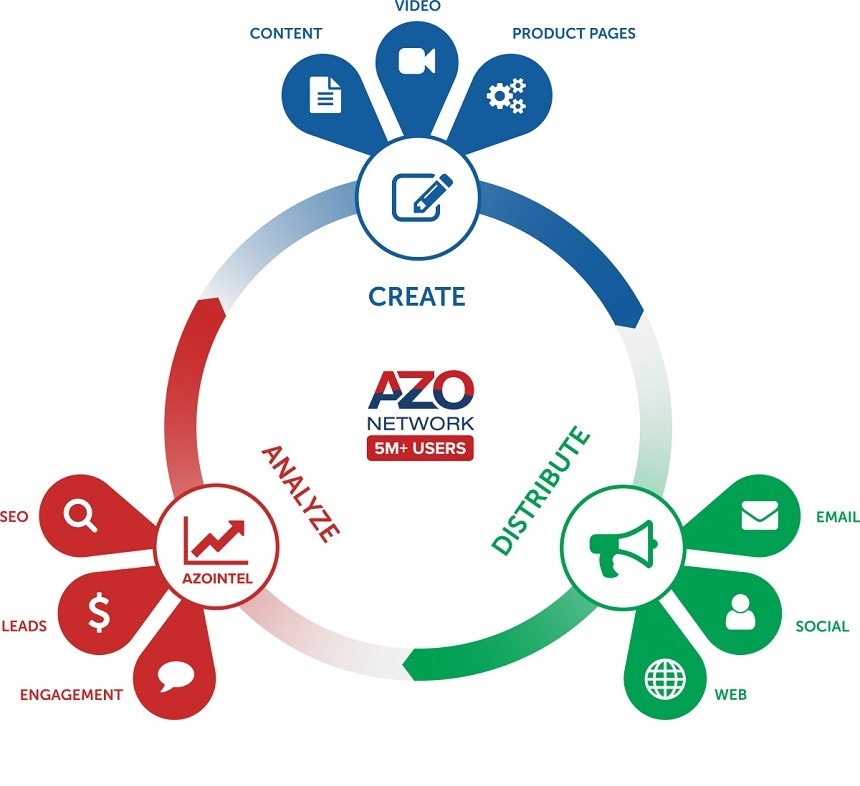
Dr Ian Birkby is the CEO of AZoNetwork and Alex Cairns is MD of Move Marketing. Below is the adapted transcript from episode 3: B2B marketing strategy for SMEs.
Subscribe | Spotify | Stitcher | Apple | Mobile | Download
Marketing Strategy for Science
How do you see the change in marketing strategy for SMEs from pre-digital to the digital era?
Ian: It’s the ability to measure what you achieve with your marketing efforts.
In the digital age it is relatively easy to measure the impact of your various campaigns and, from that, to calculate the return on your marketing investment. I could counter that by saying we are possibly getting to the “paralysis by analysis” stage where some people like to measure too many things and are getting lost in the numbers, but for me, it's the ability to quantify the performance of the campaigns.
Alex: It’s data on two aspects, because we use a lot of data for market analysis and market research in the planning phase. Once the planning is complete, we use invaluable campaign data to measure the impact of campaigns.
What are the greatest marketing challenges that your clients are faced with?
Alex: They struggle with data interpretation and insight.
It’s one thing having all of the data, but knowing how to refine it into an achievable set of objectives and actions is not a given. That's when we get involved, using our experience in interpreting data across multiple channels. It’s amazing how many businesses in the science and industrial sectors don’t understand the power of their data.
Ian: To echo that, we've invested heavily in building an analytics platform over the last seven years. Prior to that, we would say to our clients: “we've driven several thousand visitors to your site” - they'd say: “great, thanks very much!” However, they couldn't attribute those visitors to specific actions in terms of product sales and market sector activity.
So yes, using data to genuinely prove R.O.I. is a massive plus point. From original source campaign all the way to revenue generating opportunity, the multi touch-point data is there to get a full picture of the buyer’s journey along with all of the sales and marketing touch points along the way.
In which ways does B2C vary from B2B, specifically in reaching scientists and engineers?
Alex: In B2B, the markets are a lot more niche and a lot more difficult to pinpoint.
Its really trying to appeal to the types of individuals and job titles that you've got within scientific and industrial sectors.
We focus on anything that enhances the credibility that a product or a service works:
- Case studies
- White papers
- Thought leadership content
Ian: In B2B, quite often the price points are significantly higher and sales cycles are significantly longer, so you need to be writing content that satisfies all stages of the long buyer's journey. Whereas in B2C, if you've got a ten pound product you can put an Ad out on Instagram and sell it the same day.
What is the longest sales cycle which you have seen from initial contact to close?
Ian: Back when I was involved in the business of manufacturing advanced ceramics, we could be talking to a client for nine months before you get specifications correct. For a lot of our clients, if you are selling a million dollars’ worth of kit, a year's worth of discussion is not unusual.
51% of marketing managers have sales cycles between 3-12 months and many have sales cycles of 12 months+
What are the key questions that a SME science or engineering company should be asking when it comes to strategic planning?
Alex: We typically take a five step approach in terms of how we walk a client through the planning process:
- Fundamentally, what are we trying to achieve? What are the objectives?
- Market analysis - researching what's actually going on in the market.
- Competitor Analysis - what their position statements are and the marketing techniques they use.
- Understanding our value proposition – Now this sounds like an obvious one, but you’d be surprised at how many multi-million pound turnover companies have not got that core value proposition or a couple key phrases to explain what they do.
- Comprehensive strategic marketing plan - pulling all of the above together; the available channels and budget and timescales and also setting smart objectives to sit alongside all of that.

How has the internet levelled the playing field over the last twenty years?
Ian: I started AZoNetwork in early 2000 and it was very different then.
On the internet, you've got the same amount of screen space as a billion-dollar market cap company. It doesn't matter where you are found on the internet, it just matters that you are found. It became much easier as an SME to make a significant impact via the web than previously.
What do you find is the appetite for risk in in marketing specifically from the sort of C-Suite and how have people get being given license to try things?
Alex: In science and engineering, it’s low, to be brutally honest. When I was client-side, running very big budgets for big blue-chip companies, it was still quite low - even 10-15 years ago.
Strategic planning is so important because it gives validation which allows the C-Suite board to sign off on big budgets. In the absence of any kind of analysis or data to prove how well something is working, they're not going to release those budgets. Overall, there is a low appetite for risk in these sectors.
Do you see lots of companies using data to justify marketing spend or is it still based on gut-feeling?
Ian: It's becoming increasingly data focused. However, you still see people attending exhibitions solely because “our competitors are there!” That alone doesn’t really justify the activity.
Something like Google Ads can be an incredibly powerful tool as it gives you accurate data insights into your marketplace. However, we do see lots of companies adopting the “set and forget” approach to AdWords, where they often don't realize that they're actually wasting fifty percent of their budget on keywords which are no longer - or never were - delivering for them.
This lack of understanding shows us that there's a lot of slack in the marketing activity, but businesses really need to recognize that marketing is a value creator and not a cost-center. That's the sort of the old fashioned thinking that we need to move away from.
Which specific KPIs would you use in a business context, what's important to you from a marketing standpoint?
Ian: When building a business, keep it as simple as possible. When businesses start to go wrong is when people start to over complicate things so:
- Make sure you've got a good product that people want to buy.
- Make sure you've got enough cash in the bank to facilitate that activity.
- Use a balanced scorecard approach – This gives you visibility on key metrics which indicate the health of the company: Cash-flow, sales, profit margins etc.
Specifically for Marketing we look at:
- Customer Acquisition Costs (CAC) i.e. What is it costing us to acquire a customer?
- Customer retention, lifetime value and customer growth rates.
Everyone has visibility of the health of the business and can see how each department relates to the overall goal with marketing feeding into that.
Are there any marketing specific KPIs that you’d encourage your clients to measure?
Alex: Sales, profit, or sales of a certain product line. We'll typically have a list of 6-10 channels that we will work on for clients and so it can vary for every one of those.
For something like a trade show for example it would simply be quite a high cost in terms of conversion of that lead into a sale compared to an email, a webinar or social media - so they're definitely very different ends of the spectrum.
Which piece of marketing software could you not live without?
For me it’s quite personal: the AZoIntel analytics platform that we have built and developed over the last seven years. We have built our content management system, email distribution and the whole platform that we now exist upon; it's fundamental. The ability to see who is engaging with our content, that content journey, and how they're engaging with that content – that has been the bedrock of the growth of our business.

Franky: It’s about how the software interacts with each other. The sooner you can automate certain tasks - your lead scoring for instance, or lead distribution out to the sales team - the better.
We've managed to get AZoIntel talking directly to Salesforce, we can just forget about it. I know that it happens on a fifteen minute sync, so it can happen when I'm asleep, at a trade show, all of the time, 24/7.
We've managed to get AZoIntel talking directly to Salesforce, that frees up your entire morning!
Ian: AI in marketing is going to be key. The ability to have automated transcription of meetings. The ability to work out which keywords and phrases you should be using in content and how they're going to have the greatest impact.
It’s going to have the most impact where it can automate mundane, routine tasks. It has taken us several years to get reasonable value out of Salesforce because we managed to automate a lot of those manual activities.
Learn about AZoIntel
What are the biggest issues that you come up against in running a business?
Ian: Getting the culture right and getting the team working right - you could have one of the world's greatest products but if you've got a toxic culture within the business it’s going to blow up at some stage.
You have to have a goal; a clear vision and your job is to explain how you are going to get there in simple terms. Illustrate what success looks like and how individuals play a part in the team… and just keep it simple. Trust is a big factor which plays into that team working.
Ultimately, my role is more of a facilitator: I want people to tell me what I can do to make them more productive at their jobs.
Alex: You’ve got a very fast paced sector in terms of the different channels within it and the different approaches that you can take. It’s about finding techniques and methodologies that work and to do that as a team of marketers. It is about building a culture where you’ve got thinkers who can come up with the answers for both yourselves and the clients.
What marketing advice would you give yourself twenty years ago?
Alex: Don't believe the hype. Build the hype.
Ian: I came out of a manufacturing industry background and on the back of that, I saw the internet could be really good for educating engineers, designers and scientists.
At the time I knew nothing about building websites and I was led by the nose by a team of developers and spent six figures on building a website that looked really pretty and was really interesting, but search engines were never going to find it - so I wish I'd known about search engines back then and how significant they were. I would have definitely saved a few hundred grand by knowing that!
Listen and Subscribe to the Marketing Science Podcast
Subscribe | Spotify | Stitcher | Apple | iHeartRadio | Mobile | Download